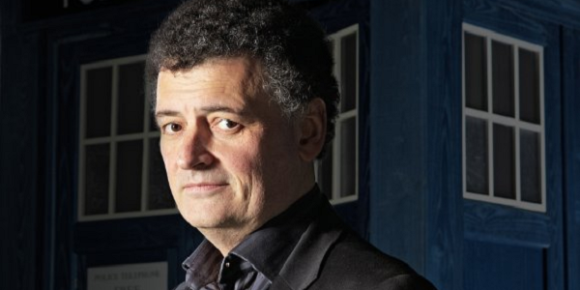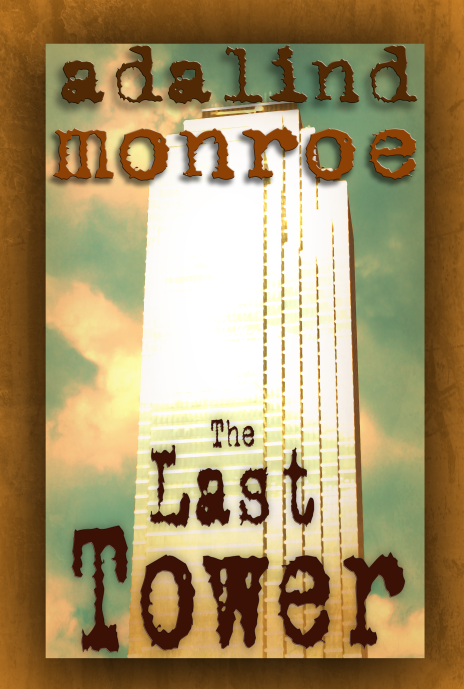
I still call myself a “Time Lord” (“Time Lady” when I’m being accurate with another fan), but I no longer call myself Whovian. And the period of time when I did call myself such was very small.
Mostly I blame Steven Moffat.

Pictured: The Face of Evil, collapsing under the weight of its own ego.
He wound us up with episodes like Silence in the Library, and Blink, which single-handedly (together) convinced us that his takeover as head writer would herald an age of darkness (in the good way), and Gothic horror. You know, like that episode written by Neil Gaiman.

The Doctor’s Something-Or-Other. Wife. That’s it. (But which is what?!)
Instead, we got darkness (in the sad way), and a horrifying dismissal of all pre-established lore in the Whoverse, including things he, himself, established in the episodes he wrote under Russell T. Davies. And all of it executed in such a short-sighted infantile fashion — why, the first three seasons under his reign played out more like the convoluted fever dreams of a child-fan than an accomplished, professional writer. I actually accused him (though not to his face, because we’ve never met — and ONLY because we’ve never met) of using his own childhood fan fiction (complete with hand-decorated giant binder) as the basis for every episode he wrote.

And this is just what he wrote in third grade! He really is a genius.
Every episode was an extreme; going from “How’s your tea?” to “WE’RE LITERALLY ALL DYING RIGHT THIS SECOND!” and back down to “What do you suppose you’ll wear for dinner?” by the end, you were either exhausted, or completely disengaged when the credits rolled. And, where before you could track the progress of tension through an entire season (with peaks and valleys for each episode), a Moffat season told you in the beginning what the Big Bad would be (or at least what to look out for), and then spent very little time laying actual groundwork for it. His energy went into packing a season’s-worth of excitement into a single episode. Every episode. And everything was wrapped up by the end in a tidy little ribbon. I’m sorry, Steven Moffat, but there are only so many times you can threaten me with the Doctor’s “super-for-reals-this-time-you-guys” death before I stop caring about it, or any danger you try to make me believe he’s in.
Seriously. You’ve proven he’s basically invulnerable and he’s never going to die, so it doesn’t matter what kind of danger he’s in. Yawnsville all the way.

Because, honestly, it was never about whether or not he COULD die. It was about our emotional connection with him in the moment.
With Russel T. Davies and David Tenant we cared that enough damage to his body meant he wouldn’t be Ten anymore, because the Doctor spent so long being desperately afraid of it. He dreaded this thing — this prophesied thing– so much, he fought as hard against its inevitability as he fought against anything threatening the universe. He went out of his way to put an end to it, to fight what he thought was it. Avoiding the “end of his song” consumed him. So when it finally came and it wasn’t even the apocalyptic scenario he’d spent so much time and energy fighting, we all cared. Our stomachs plummeted with his when we all realized what it meant.
A lot of that came from within. The Tenth Doctor wanted to remain the Tenth Doctor. It wasn’t the idea that the Doctor was dying and would never live again that made us cry so hard; it was the fact that he so desperately didn’t want to go, and that he had no choice. We mourned that Doctor, because we also knew it was inevitable and unstoppable, because we spent a season fighting his demons with him, and we saw it catch him anyway. He’d cheated regeneration once! But that window had well and truly passed. There was no way out, and we all knew it. We spent a whole episode saying goodbye to everyone he loved — everyone we loved — with him.
And then we all cried our hardest when the regeneration finally came.

When Ten arrived, he taught us that the Doctor is always the Doctor, no matter which Doctor he happened to be at the time. But when he left, he taught us that the Doctor dies every time he’s born again.
All of this mattered, because they took the time to connect us to the moment, and that moment was telegraphed through time with the beating of two hearts heard as drums in the Master’s mind, and four innocent knocks on a simple radiation-proof glass door, specifically so that moment would punch us in the collective gut.

And it worked.
But, in the Moffat seasons I see episodes that establish an enemy as being the single worst thing to ever happen ( … to exposition). Because that’s how we learn how terrible they are. Not through reactions, or behavior, or casual mention in any moment before, but exclusively in the episode in which they’re meant to be a threat, and exclusively in the Doctor reciting a galactic Wikipedia entry about the threat. All of time and space to pull from (all the 50+ years of history), and even if the enemy is brought in from the past, there’s a mountain of exposition to contextualize the encounter just for that episode, because it has no greater impact on the rest of the season more often than not.
That is, if it’s not one of the Big Three.
I see convoluted plots attempting to blow our minds with the level of their creativity, but it all means so little to me. It’s all so much “look at what I’ve built!” that I’ve mostly written it out of the lore in my head; it was too damn awful to acknowledge.

Pictured: As much context per moment as I felt from Moffat’s writing.
The final Matt Smith season saw improvement, and a lot of that came from the fact that Moffat was no longer the lead writing name on EVERY of the episodes. Other writers were allowed to take the lead for different episodes, and it got so much better.
Though for me, sadly, it did not improve enough.
For now, when I see promotional pictures, or even something as iconic and once-beloved an image as the TARDIS … I just scroll past. I want nothing to do with it.
The same three enemies recycled endlessly. Dalek, Cybermen, The Master. Dalek, Cybermen, The Master. Eventually, they’re all meaningless; the punchlines of jokes people stopped telling a long time ago. We don’t believe you when you say they’re defeated. It worked in the beginning, because we legitimately weren’t expecting them. Now we know they’ll always be there, so there’s no point pretending they’re gone, even for a minute.
Everything about the show is meaningless for me, now. They don’t give me time or a reason to care about anyone or anything in that universe, anymore. And what reason they do provide, they give through exposition, informing me why I’m SUPPOSED to care, instead of giving me the opportunity to want to care.
I made myself watch the first Capaldi season, as I made myself sit through the terrible Matt Smith seasons (terrible for Moffat, not for Matt), but I finally had to give up.
There’s only so much that love of the Davies years can overcome, and I have gone well past that limit, already. I’ve been clinging to the love of something already gone, and the hope for something that can never be under this Moffat regime, and, as with any relationship with people who have grown too different, there eventually comes a day when you have to admit that what you loved and what you cling to are no longer the same, and it’s time to let it go.
I used to be a Whovian, and for Nine and Ten, I shall quietly remain a fan, but my love ends there. As, sadly, does any last trace of interest in the show.
—-
Adalind Monroe is a writer in the Pacific Northwest who is very sorry to end on such a sad, sad note, but it couldn’t be helped. If you made it this far, she rewards you with a sleepy puppy sticking his tongue out.


